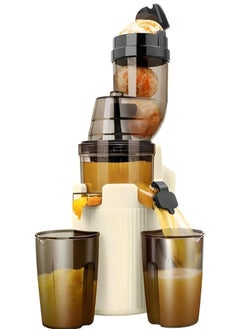Highlights- -Slow Juicing Process: Operates at a low speed to extract juice efficiently while preserving nutrients. Reduces heat buildup and oxidation, which can degrade the quality of the juice in high-speed juicers.
- -Cold Press Technology: The "cold press" refers to the lack of heat generated during the juicing process, which helps preserve the nutritional integrity of the juice.Ideal for making juice that can be stored for up to 72 hours without significant nutrient loss.
- -High Juice Yield: Masticating juicers extract more juice from the same amount of produce compared to centrifugal juicers, leaving drier pulp behind.The juicer’s auger (a spiral screw) efficiently crushes and presses the produce to maximize juice extraction.
- -Versatile Juicing Capability: Effective for a wide variety of produce, including hard fruits like apples, fibrous vegetables like celery, and leafy greens like spinach and kale.Many models can also make nut milks, baby food, sorbets, and even grind coffee or spices, making them highly versatile kitchen tools.
- -Nutrient-Rich Juice: Retains more vitamins, enzymes, and antioxidants due to the slow, gentle extraction process.Produces juice with a smoother texture, less foam, and more concentrated flavor compared to centrifugal juicers.
- -Quiet Operation: Masticating juicers are quieter than centrifugal juicers, making them more suitable for use at any time without causing noise disruption.
- -Durable Auger: Equipped with a robust auger (a rotating screw-like part) that grinds and crushes produce efficiently.The auger is made of sturdy material stainless steel, ensuring long-lasting performance.
- -Compact and User-Friendly Design: Often has a compact design that fits easily in most kitchens.Simple assembly and disassembly make cleaning easy, with most parts being dishwasher-safe.
- -Longer Shelf Life of Juice: The juice can be stored for longer (up to 72 hours) due to minimal oxidation during the juicing process.This is perfect for people who want to prepare juice in advance and store it without losing its nutritional value.
- -Energy Efficiency: Consumes less power compared to high-speed juicers, making it more energy-efficient for daily use.
OverviewA masticating juicer, also known as a slow juicer or cold press juicer, is a kitchen appliance designed to extract juice from fruits, vegetables, and leafy greens using a slow, grinding process. It differs significantly from centrifugal juicers, which operate at high speeds and use spinning blades. Instead, a masticating juicer uses an auger (a spiral screw mechanism) that grinds and crushes the produce at a low speed, typically between 40-100 RPM (rotations per minute), ensuring that the juice is extracted in a way that retains maximum nutrients, enzymes, and flavor. The slow and gentle juicing process is why it’s called "masticating" – a term derived from the chewing motion used to break down food.A masticating juicer is a premium kitchen appliance for individuals who prioritize high-quality, nutrient-rich juice and value long-term health benefits. Although slower and pricier than centrifugal juicers, its superior juice extraction, minimal oxidation, versatility, and quieter operation make it an excellent choice for health enthusiasts, juice lovers, and anyone looking to make the most out of their produce. The juice produced is richer in flavor, higher in nutritional value, and can be stored longer, making it a long-term investment for a healthier lifestyle.
{Benefits of Masticating Juicers}
>Maximum Nutrient Retention: The slow and cold pressing process preserves more vitamins, minerals, and enzymes than centrifugal juicing.
>High Juice Yield: Efficient extraction means less waste and more juice from the same amount of produce.
>Quiet Operation: Makes less noise, ideal for households with noise concerns.
>Versatility: Can juice a wide variety of fruits, vegetables, and leafy greens, and perform additional tasks such as making nut butters or baby food.
>Longer Shelf Life of Juice: Juice can be stored for up to 72 hours without significant nutrient degradation
Free & Easy Returns
Best Deals






